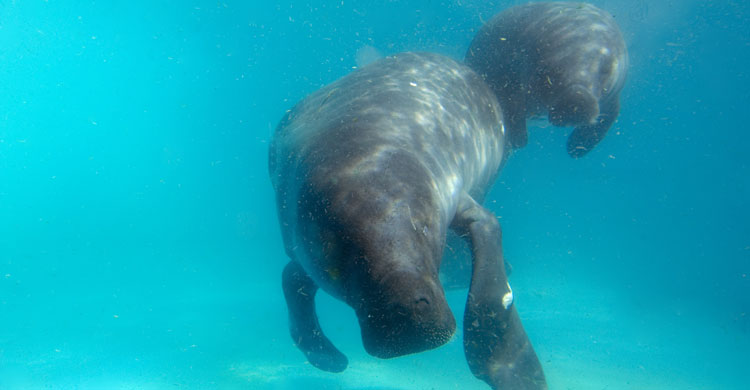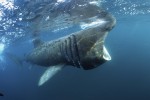Brazil Joins the Convention on Migratory Species

Manatí del Amazonas © Andre Seale/Robert Harding
The Accession of Brazil, one of the World’s Mega-Biodiverse Nations, Increases CMS Membership to 122
Bonn, 1 October 2015 – Brazil today became a Party to the UN-led Convention on Migratory Species (CMS), enabling South America’s largest country to work with other nations under the Convention to better support and protect the enormous variety of its fauna.
Izabella Teixeira, Minister of the Environment of Brazil, said: "Brazil's ratification of the Convention on Migratory Species confirms the country's firm commitment to the conservation and sustainable use of biodiversity. By means of this initiative, Brazil will be able to further strengthen cooperation for environmental protection with its international partners and to contribute to global efforts focusing on migratory species. Brazil is looking forward to work in close collaboration with CMS Parties and under the auspices of that Convention in the areas of research, conservation and sustainable management of migratory species, which are particularly important for Brazilians because of the characteristics of our large territory."
From the gentle manatee to the champion traveller, the sanderling, Brazil boasts an amazing richness of wildlife. Its diverse network of ecosystems provides shelter to thousands of animals including many migratory ones.
Country Profile
Among the many migratory animals occurring in Brazil listed by CMS as threatened with extinction are the Eskimo Curlew, the Caribbean Manatee, the Sperm Whale, the La Plata Dolphin and the Great White Shark.
CMS is an inter-governmental treaty concerned with the conservation of wildlife and habitats on a global scale, covering terrestrial, aquatic and avian migratory species. The United Nations Environmental Programme (UNEP) provides the Secretariat to the Convention.
CMS Executive Secretary Bradnee Chambers, said: “By becoming a contracting Party to the Convention, Brazil has filled a major gap on the conservation map of the Western Hemisphere and South America. Brazil joins other G20 countries such as India and South Africa as a Party to CMS, which is increasingly being recognized as an important global forum to promote the conservation of threatened migratory species including many iconic animals.”
Brazil is one of the world’s 17 mega-biodiverse nations, and its abundance of plant and animal life is unmatched by any other country. It contains two biodiversity hotspots - the Mata Atlantica (Atlantic Forest) and the Cerrado— six terrestrial biomes and three large marine ecosystems. The country also hosts the only reef environments of the South Atlantic, distributed along the north-eastern coast.
Almost two thirds of the country is covered by the Amazon rainforest, providing home to one third of all animal species worldwide, many of which are endangered. Brazil has the highest known number of species of plants, freshwater fish and mammals. It is also third in the world in bird species and second in reptiles. On average, 700 new animal species are being discovered in Brazil every year.
Earlier, Brazil joined other CMS Parties to better protect Southern South American Migratory Grassland Bird Species and their habitats. In addition to habitat loss and fragmentation, grassland birds are threatened by agrochemicals, pollution and illegal capture.
Brazil is also already a signatory to the CMS agreement on albatrosses and petrels, seabirds which often fall victim of bycatch in fishing nets. Shorebirds that pass through Brazil on their annual migration from Alaska to Terra del Fuego and back also benefit from enhanced regional collaboration.
Brazil is one of the countries with the greatest variety of migratory shark species, 13 of which are listed on the CMS Appendices and Annex 1 of the specialized CMS instrument on these fish. Ranked 13th on the FAO list of the top shark-catching nations, Brazil works with Regional Fisheries Management Organizations to apply regulations on shark finning.
Joining forces with other South American countries that are Parties to the Convention - Argentina, Bolivia, Chile, Ecuador, Paraguay, Peru and Uruguay - will allow Brazil to boost the conservation of migratory species in the region.
For further information, please contact:
Florian Keil, Coordinator of the Common Information Management, Communication and Outreach Team of the UNEP/CMS and UNEP/AEWA Secretariats, e-mail: [email protected]; tel: +49 (0)228 815 2451
Veronika Lenarz, UNEP/CMS Secretariat, e-mail: [email protected]; tel. +49 (0)228-8152409
Francisco Rilla, UNEP/CMS Capacity-Building Officer, e-mail: [email protected]; tel. +49 (0)228 815 2460
Related links:
Notes to editors:
The Convention on the Conservation of Migratory Species of Wild Animals (CMS) aims to conserve terrestrial, aquatic and avian migratory species throughout their range. It is an environmental treaty of the United Nations concerned with the conservation of wildlife and habitats on a global scale. With Brazil’s accession there are now 122 Parties including the European Union to the Convention.
www.cms.int
Last updated on 16 January 2020







